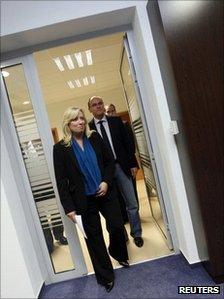National sovereignty and the European project
- Published
- comments

Ms Radicova failed to persuade coalition partner Richard Sulik (right)
Democracy was on display for much of Tuesday in the Slovak capital Bratislava.
It was, at times, messy, self-interested, cynical and exasperating but open, revealing and reflecting the arguments on the street. In the event a prime minister lost her job and a new note of uncertainty hung over the eurozone.
Slovakia has rejected expanding the powers of the eurozone's main bailout fund, the European Financial Stability Facility , external(EFSF).
All 16 other eurozone states voted in support, and were dependent on Slovakia also delivering a "yes".
However, one party in the governing coalition held out.
Their view was that it was quite impossible for Europe to "solve the debt crisis with new debts".
"The only thing that will help is to face the truth," the party argued. "Greece must declare bankruptcy, Italy must start saving and the rules set up by the eurozone must finally start being observed."
Prime Minister Iveta Radicova begged her allies not to make this stand. She said it was about the standing of Slovakia with the rest of Europe. It was about trust.
Later, struggling to hold back tears, she asked whether her opponents judged all 16 other governments to be stupid.
The opposition spied an opportunity. They are actually in favour of the new bailout fund but withheld their support, seeking to oust the prime minister. It is the stuff of politics.
Behind the curve
Some time - possibly as early as Wednesday - there will be a new vote and a majority will appear in favour of the main weapon to fight Europe's debt crisis.
The uncertainty in Slovakia has unsettled financial markets but it has fed into a wider judgement that Europe, in this crisis, has shown a lack of leadership.
It has been behind the curve. The bond markets have been driving events. The politicians have been playing catch-up.
From the sidelines President Barack Obama, UK Prime Minister David Cameron and countless others have been urging Europeans to find solutions and quickly.
It is true that countless summits and meetings have failed to deliver but Europe's leaders have to bring their electorates with them and there is widespread public doubt that the policies are working. Bailouts and loan guarantees are hugely unpopular.
In papers across Europe, 91 prominent Europeans have signed what amounts to an "appeal to Europe".
Among them are 10 former prime ministers and presidents. George Soros is there. So, too, Joschka Fischer, Bernard Kouchner and Guy Verhofstadt.
Their message has been delivered to all 17 leaders in the eurozone. They reveal the same frustration that the measures taken so far are "too little and too late".
Sovereignty at stake
The signatories want not national solutions, but bold European solutions. Amongst their proposals is a common treasury that can raise funds for the eurozone.
Now some of the signatures believe in a "United States of Europe". That is their goal.
Others belong to the "ever-closer-union " crowd. Others believe that what is at stake is the European project itself, and that it is too precious to be allowed to break apart.
They warn that if the eurozone crisis is not resolved, it could undermine or even destroy the global financial system.
They want European, not national solutions. They want a common treasury. They want changes that will, however, weaken the sovereignty of Europe's nations, and that brings us back to politics.
The feet of many Europeans stamp impatiently but these changes - however desirable - cannot be just nodded through.
Many observers say that the pressing issue is how to preserve financial stability and the single currency but others feel equally strongly that that must not come at the expense of democracy.
In the meantime, Europe's leaders press towards their stated goal of coming up with a comprehensive solution by the end of the month.
They have to find three answers: to explain what will be done with Greece and its debts; to strengthen Europe's banks so they can withstand a shock of a sovereign default and to build a financial umbrella that could, if needed, shelter Italy.
It is an immense challenge that, at the end, will surely have changed Europe and challenged its democracies.